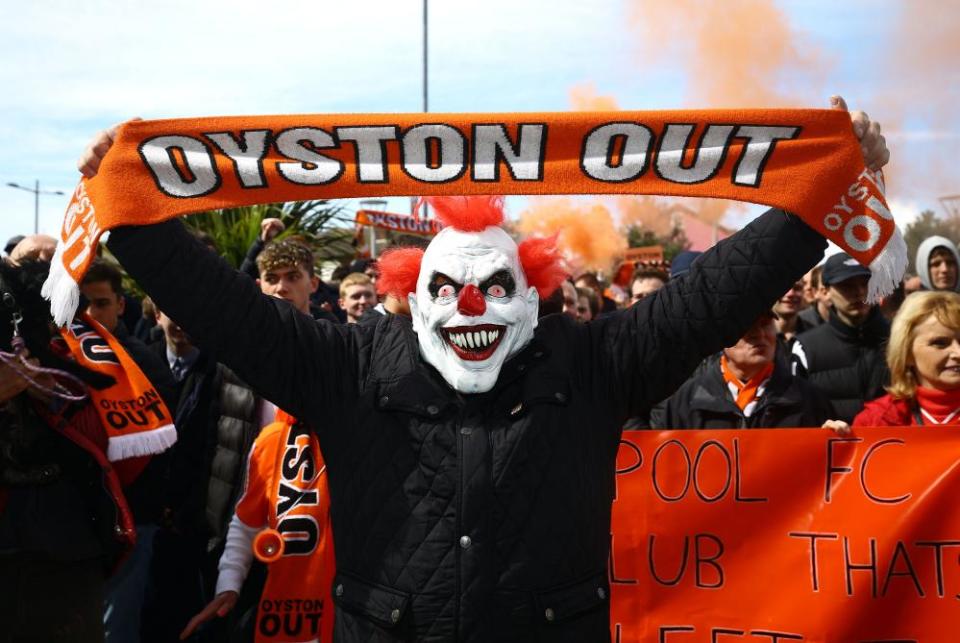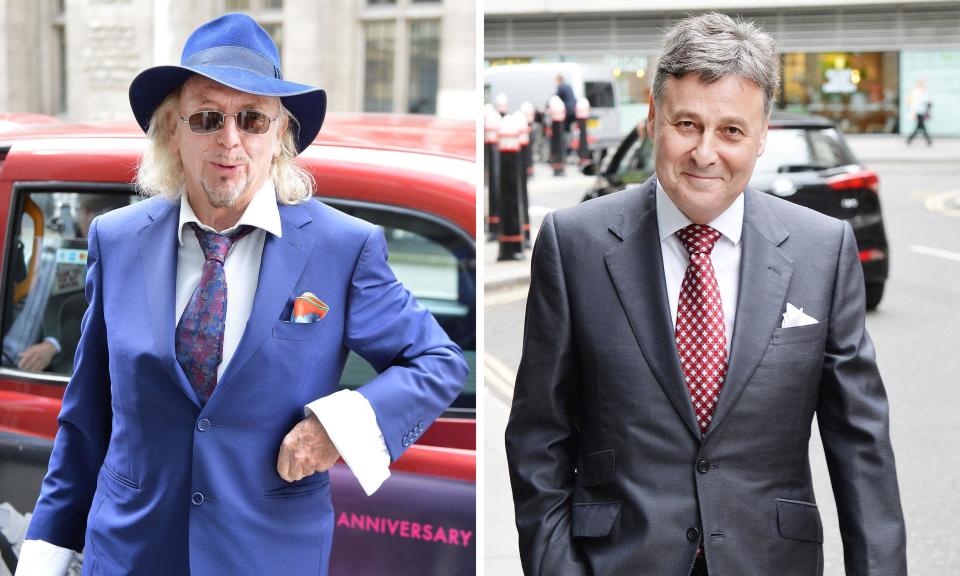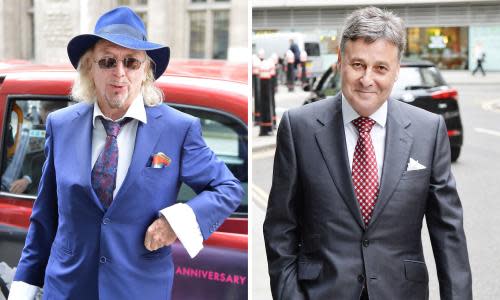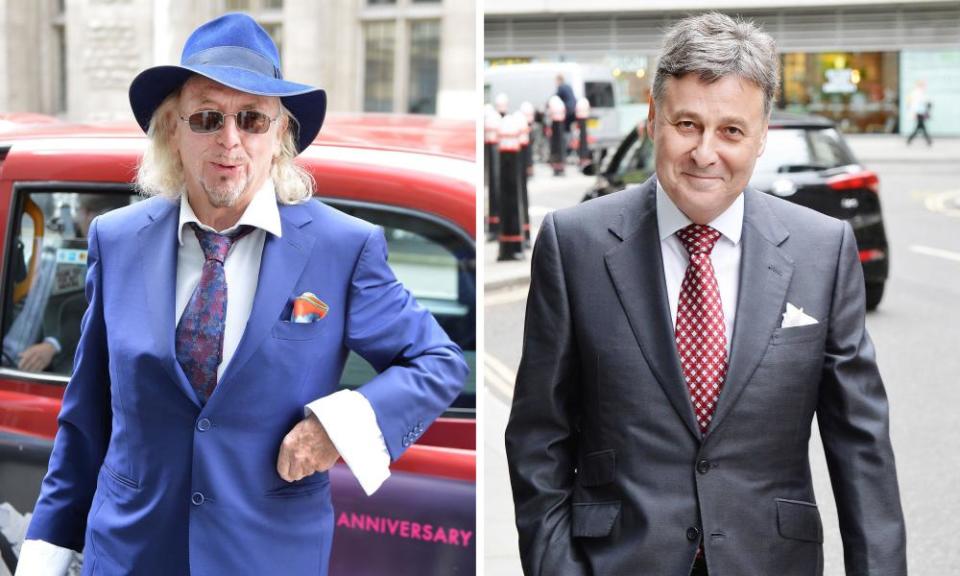Blackpool FC, a Kyrgyzstan money-laundering conviction and a non-takeover
When the Latvian bank mogul Valeri Belokon won his landmark high court case against the Blackpool owner, Owen Oyston, last November, it seemed finally to deliver the means of ending Oyston’s long, toxic tenure at Bloomfield Road. Yet nearly a year on Oyston remains in charge despite the ruling that he “illegitimately stripped” the club of £26.77m after its one jackpot season in the Premier League, and must pay that huge sum to Belokon, plus the Latvian’s original £4.5m investment and costs.
Belokon can seize and sell any Oyston assets to realise that £34m total but the club is out of his reach. He is prevented by the EFL’s owners and directors “fit and proper person” test, which bars people who have a criminal conviction involving dishonesty. Obscure as it appears, Belokon does have one, for money laundering, in the central Asian republic of Kyrgyzstan, following a court hearing there last year in his absence.
READ MORE: Carrick: Ferguson fumed as he announced retirement
READ MORE: Eriksen to be fit for Spurs’ clash with West Ham
READ MORE: Can Mourinho repeat Luke Shaw trick to keep Martial and Pogba at United?
The Blackpool Supporters’ Trust has held demonstrations outside the EFL’s Preston headquarters, arguing it is outrageous that Oyston is not banned, despite a 1996 conviction for rape, because the EFL does not take into account crimes committed before its test was introduced in 2004.
Belokon said in March he was “working with the EFL to provide them with the necessary information” to show “why I should be considered fit and proper”. He denounced the Kyrgyz conviction as “politically motivated”, claiming it “ignored the most basic principles of natural justice”. The EFL told the Guardian that following discussions it had “clearly identified the additional information required” if it is to disregard the conviction and overturn the banand was “committed to reviewing the position” when it receives it.
Belokon’s conviction in Kyrgyzstan, where corruption is entrenched and the rule of law inadequate, appears remote and lacking credibility but the government has succeeded with similar allegations against Belokon in court proceedings in France.
In 2007 Belokon did become very involved in Kyrgyzstan, operating a bank there, named Manas. He had a business partnership with Maxim Bakiyev, the son of the then president, Kurmanbek Bakiyev, whose regime was loathed; the Royal Institute of International Affairs described it as “a byword for rampant nepotism and corruption”.
The Bakiyevs were ousted in April 2010 and the Kyrgyzstan national bank immediately took over five banks suspected of money-laundering – including Belokon’s. Belokon took the Kyrgyz government to arbitration and won in 2014 at a Paris hearing. The Kyrgyz government appealed and appointed the law firm King & Wood Mallesons (KWM) to marshal the evidence.
On 21 February 2017 the Paris court of appeal delivered a damning judgment in favour of the Kyrgyz government, finding that Belokon had bought Manas Bank in a rigged process, “in order to develop … money-laundering practices”. The court said such money laundering would not be monitored in Kyrgyzstan because of Belokon’s “privileged” relationship with Maxim Bakiyev. The arbitration award of $15m to Belokon for the loss of his bank must not be enforced, the court ruled, because to do so would reward him for “criminal activities”.

Andrei Yakovlev, the KWM partner who represented the Kyrgyz government, told the Guardian that his firm had thoroughly reviewed evidence and made further inquiries which formed the basis of the cases brought in the Paris court of appeal and for the criminal conviction in Kyrgyzstan three months later.
The Paris court noted that after Belokon took over Manas Bank, $5.2bn flowed through its accounts in less than three years, and concluded this “dazzling success” in a poor country “cannot be explained by orthodox banking practices”.
Bank records were presented to the court showing, the Kyrgyz government alleged, that accounts had been opened in the names of people whose identification documents, including passport details, had been stolen without their knowledge. One company, Lakerock Contracts Ltd, which was registered in New Zealand, had $534m go through its account in nine months. Examination of the company’s registration documents found that the named company head, and sole signatory for the multimillion-dollar account, was a taxi driver in Belarus. When interviewed on request by the Belarus police, he told officers that he had never signed any of the documents and knew nothing about Manas Bank or Lakerock.
Another company presented in evidence by the Kyrgyz government, BMD Commerce, had $24m through its account in a year, including multimillion-dollar physical cash deposits and withdrawals. The authorised account holder on the Manas Bank forms was a resident of Latvia. The government submitted evidence that Latvian police and Kyrgyz border records showed this person to be a 20-year-old man who had never been to Kyrgyzstan. Subsequently the investigation found he was serving a prison sentence in Latvia when much of the account activity was taking place.
The Paris court of appeal concluded in its judgment: “There are serious, specific and concordant indications that [Manas] Bank was taken over by Mr Belokon in order to develop, in a state where his privileged relations with the holder of economic power guaranteed him the absence of any true monitoring of his activities, money-laundering practices which could not have flourished in the less favourable environment of Latvia.”
Belokon claimed that the Kyrgyz government made 'ungrounded accusations' against him and fabricated evidence
Belokon argues that the criminal conviction and 20-year prison sentence in Kyrgyzstan that followed were politically motivated, government revenge for his win in the 2014 Paris arbitration. The Paris court of appeal judgment notes, however, that criminal proceedings did begin in Kyrgyzstan in January 2011. Belokon claims the criminal process “ignored the most basic principles of natural justice”, including that he was not even given notice that the court hearing was happening. The Kyrgyz government position is that Belokon was given notice of the proceedings but chose not to go; the conviction records that he had lawyers at the court representing him.
In a series of emails responding to questions from the Guardian, Belokon claimed that the Kyrgyz government made “ungrounded accusations” against him and fabricated evidence, engaging in “the misinterpretation of facts, manipulation [of] them and … outright falsification of documents”. He claimed that the evidence of fraud and identity theft, of the Belarus taxi driver and 20-year-old Latvian convict, were “a clear example of falsification of documents”.
Yakovlev responded by explaining that his firm of lawyers had examined the Manas Bank files and electronic records, cross-checked evidence of money transfers, and that hundreds of people identified as account holders had been interviewed, some reinterviewed, by law enforcement authorities in several different countries. “A suggestion that the Kyrgyz authorities have falsified the evidence is not credible,” he said.
Belokon said he intended to appeal against the Paris judgment but was blocked from doing so in July because he has not paid the costs – understood to be €300,000 – he was ordered to pay the Kyrgyz government. He said he intended to submit documents to the EFL demonstrating why he should be considered “fit and proper” to own Blackpool but is waiting until he has finished enforcing his judgment against Oyston.
Oyston has told the Guardian he is committed to paying Belokon the £34m and to keeping Blackpool going until he can find “a safe pair of hands” to buy the club.
“As Valeri Belokon is banned, he can’t take it over,” Oyston said, “so it’ll have to be someone else.”
Mr Justice Marcus Smith, who heard the case in London, lent support to the view that the EFL’s ban on Belokon was unreasonable, saying in his judgment: “It does seem extraordinary that a conviction [in Kyrgyzstan] not on the merits, but based on nonattendance by Mr Belokon, should have this effect.”
But the judge added an important qualification. “Of course,” he said, “I know nothing about the events that have brought this exclusion of Mr Belokon about.”

 Yahoo Sport
Yahoo Sport 













































